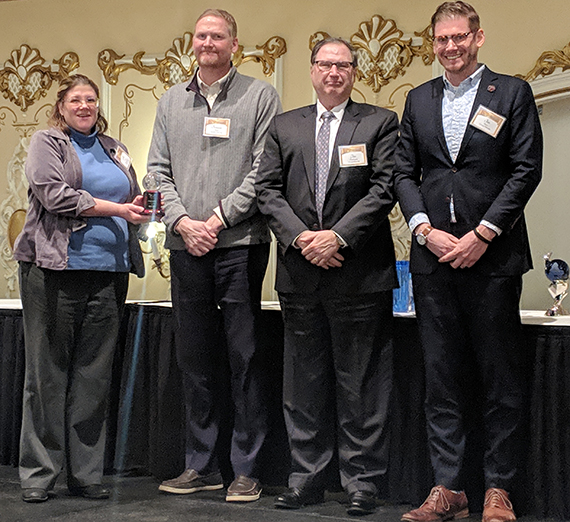Gonzaga Receives 2019 Clean Air Award

Efforts to Reduce Energy Use, Emissions Recognized
SPOKANE, Wash. — The Spokane Regional Clean Air Agency has honored Gonzaga University as the 2019 Clean Air Award recipient for its exemplary work across campus to improve energy efficiency and reduce emissions through voluntary measures and innovative practices, the agency announced.
In the last 10 years, GU’s plant services has seen a 23 percent increase in gross square footage of the buildings it manages – roughly 2.9 million square feet requiring lighting, heating, cooling, and ventilation. Even with this growth, Gonzaga’s overall emissions have decreased by implementing strategies to increase campus energy efficiency.
Tomson Spink, Gonzaga’s grounds and facility maintenance manager, said during the past 10 years the university’s overall consumption of natural gas has dropped by 27 percent and electric consumption grew by 4 percent — remarkable figures, Spokane Clean Air noted, considering this occurred during a period of significant growth.
Following are additional efforts that are making a difference:
• Replaced some large, less efficient natural-gas fired boilers used for campus heating with smaller and more efficient units. This alone has reduced emissions of five air pollutants by 24 percent — or three tons annually.
• All new building construction must be certified to Silver LEED level.
• Lighting is replaced with high-efficiency LED fixtures, bulbs and tubes and lighting controls that include dimming, daylighting, and vacancy sensing.
GU has been a leader in transportation as well. In addition to its robust Commute Trip Reduction program, the University employs two shared mobility programs to encourage the use of alternative commute options: Zipcar and more recently, Lime bikes.
Gonzaga launched the Zipcar program in 2012 with two Zipcars that allow commuters to run errands and make trips without requiring the purchase, maintenance and use of personal vehicles. According to Jim Simon, GU’s director of sustainability, during the last academic year, Zipcars were used more than 1,000 times, covering more than 20,000 miles and cutting an estimated 478,000 pounds of carbon dioxide.
The campus recently piloted the Lime bikes program, beginning with a fleet of 50 bikes. During the two-month pilot program, Gonzaga users logged more than 13,000 miles in more than over 23,000 rides, Simon said.
In 2015, GU launched the Universal Transit Access Pass program. Last year, students and faculty rode STA buses more than 43,000 times. Each trip on a bus rather than in a car helps lessen road congestion and reduces emissions.
“To further support those making decisions in their personal lives to combat greenhouse gas production, the University installed a set of ChargePoint stations on campus in 2016. These electric vehicle charging stations alleviate the ‘range anxiety’ often associated with e-vehicles, making them a more feasible alternative to traditional modes of transportation that rely on fossil fuels,” Simon said. The ChargePoint stations have served 23 unique drivers since their installation.
“For all of these reasons, Gonzaga University is our 2019 Clean Air Award recipient,” announced Spokane Clean Air’s Executive Director Julie Oliver in a ceremony Feb. 7. “Their actions benefit our community and the air we all share.”
The Clean Air Award is presented annually to recognize innovation and commitment to reduce air emissions and improve air quality in Spokane County. For more information visit www.spokanecleanair.org/business/recognition or contact Lisa Woodard at (509) 477-4727, ext. 115.
